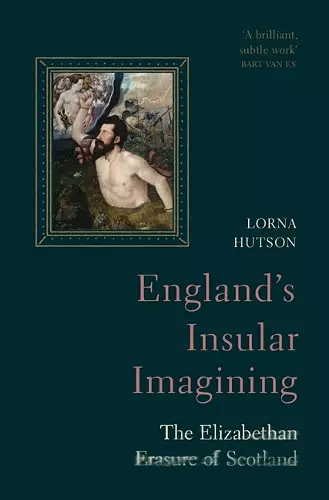England's Insular Imagining
The Elizabethan Erasure of Scotland
Format:Hardback
Publisher:Cambridge University Press
Published:9th Nov '23
Should be back in stock very soon

Our image of England as island nation is the legacy of the Elizabethan literary erasure of Scotland.
England's Insular Imagining is vital reading for anyone interested in British nationhood. It shows how the English used Geoffrey of Monmouth's mythical 'British History' (1137) first to justify an attempted Scottish conquest, then to make Scotland's nationhood vanish in new literary, legal and cartographic figurations of English sea-sovereignty.How have the English conceived of Scotland? Lorna Hutson's book is an essential intervention in the contested narrative of British nationhood. It argues that England deployed a mythical 'British History' in pursuing dominion over its northern neighbour: initially through waging war, and then striving to make the very idea of Scotland vanish in new figurations of sea-sovereignty. The author explores English attempts at conquest in the 1540s, revealing how justifications of overlordship mutated into literary, legal and cartographic ploys to erase Scotland-as-kingdom. Maps, treatises and military propaganda are no less imaginative in their eradicative strategies than river poetry, chorography, allegory, epic, tragedies, history plays and masques. Hutson shows how Spenser's Faerie Queene, Shakespeare's Henry V and King Lear, Plowden's theory of the King's Two Bodies, Camden's Britannia, and the race-making in Jonson's Masque of Blackness are all implicated in England's jurisdictional claim and refusal to acknowledge Scotland as sovereign nation.
'This is, quite simply, a superb book. Ranging across a wide variety of sources - legal documents, neo-Latin, visual arts, cartography, poetry, prose, and drama - it does urgent and necessary work, anatomising the fiction of England's depiction as an 'island' nation and addressing the neglect of Scotland in accounts of English nationhood, an occlusion which Hutson convincingly traces to the persistent legacy of Tudor propagandists.' Cathy Shrank, Professor of English, University of Sheffield
'Lorna Hutson's brilliant book demonstrates how Elizabethan writers actively marginalized Scotland in the service of an Anglo-imperial view of English insularity. As Hutson shows, the trope of England as an 'island nation,' usually taken to be a mere geographic incoherence, is integral to an ideological project designed to diminish Scotland. Featuring incisive analyses of paintings, maps, chronicle histories and literary texts by Shakespeare, Spenser, Jonson and others, England's Insular Imagining will transform the ways in which scholars think about both Anglo-Scottish relations and the formation of English national identity in the early modern period.' Garrett Sullivan, Liberal Arts Professor of English, The Pennsylvania State University
'This powerfully innovative book is an astonishing achievement. It transforms our understanding of early modern literature by recovering and precisely explicating the history of invasion and occlusion that characterises England's relationship with Scotland from the 1540s to the 1600s. Anyone interested in race, ethnicity and nationhood, and the persistence of Scottish cultural and political identity, will learn from its many insights. Drawing on a huge range of sources, from medieval chronicle and Tudor polemic through battlefield reports, Lorna Hutson gives us fresh, authoritative readings of such canonical works as The Faerie Queene, Henry V, King Lear and Macbeth.' John Kerrigan, Professor of English, St John's College, Cambridge
'In the lengthening shadow of Brexit, this exciting book is as timely as it is innovative for the politics of major Elizabethan writing. Turning from static ideology to active imagining, Hutson shows how authors built the strange conceptual space of the 'sceptred isle' by erasing the inconvenient reality of Scotland. A 'must read' for anyone navigating the currents of literary imagination, sovereignty, insularity, and the politics of boundaries.' Gordon Teskey, Francis Lee Higginson Professor of English Literature, Harvard University
'Once Hutson has pointed it out, the absence of Scotland in Tudor culture is, paradoxically, unmissable. This radical reassessment shows with lucid delicacy how literature was requisitioned in service of a wobbly concept of English insularity. Shakespeare's famous 'this sceptred isle' turns out to be less a specific rhetorical anomaly and more a central statement of ideological erasure.' Emma Smith, Hertford College, University of Oxford
'In this masterful new literary history of English imperialism, Lorna Hutson trains her keen eye on the obscured histories of Tudor wars of conquest in Scotland and claims of English overlordship. Her astute unpacking of the rhetorical strategies of English imaginative work have resonance beyond Anglo-Scottish relations. This important book recovers Scotland as a forgotten early case of English imperialism that would later expand across the globe.' Su Fang Ng, Professor of English, Virginia Tech
'A brilliant, subtle work. As the first scholar to fully understand the importance of the English campaigns against Scotland in the sixteenth century, Lorna Hutson transforms our understanding of early modern British nationhood.' Her book offers a set of revelatory readings of works by Spenser, Jonson, and Shakespeare, whose plays and poems are newly understood as being shaped not just by Scottish politics but also by the English state's efforts to imagine itself as an island nation, in defiance of geography.' Bart Van Es, author of The Cut Out Girl (winner of the 2018 Costa Book of the Year) and Professor of English Literature, St Catherine's College, Oxford
'… a most magnificent constitutional and literary history …' Joyce McMillan, The Scotsman
'This book will incite arguments, breed scholarship, beget articles and enrich our understanding of a period we thought we knew well… Hutson has not just laid the groundwork for the next generation of critics; she has set the bar high for future interdisciplinary work in this field.' Willy Maley, TLS
'This well-researched, well-written, and lavishly illustrated work opens new avenues of investigation into the entanglement and interactions of the peoples and nations of the British Isles. … Highly recommended.' S. J. Stillwell Jr, CHOICE
'although Hutson has not managed singlehandedly to pull Scotland out of Great Britain, she has put its geopolitical situation into a new perspective.' John Kerrigan, London Review of Books
ISBN: 9781009253574
Dimensions: 235mm x 161mm x 25mm
Weight: 670g
320 pages